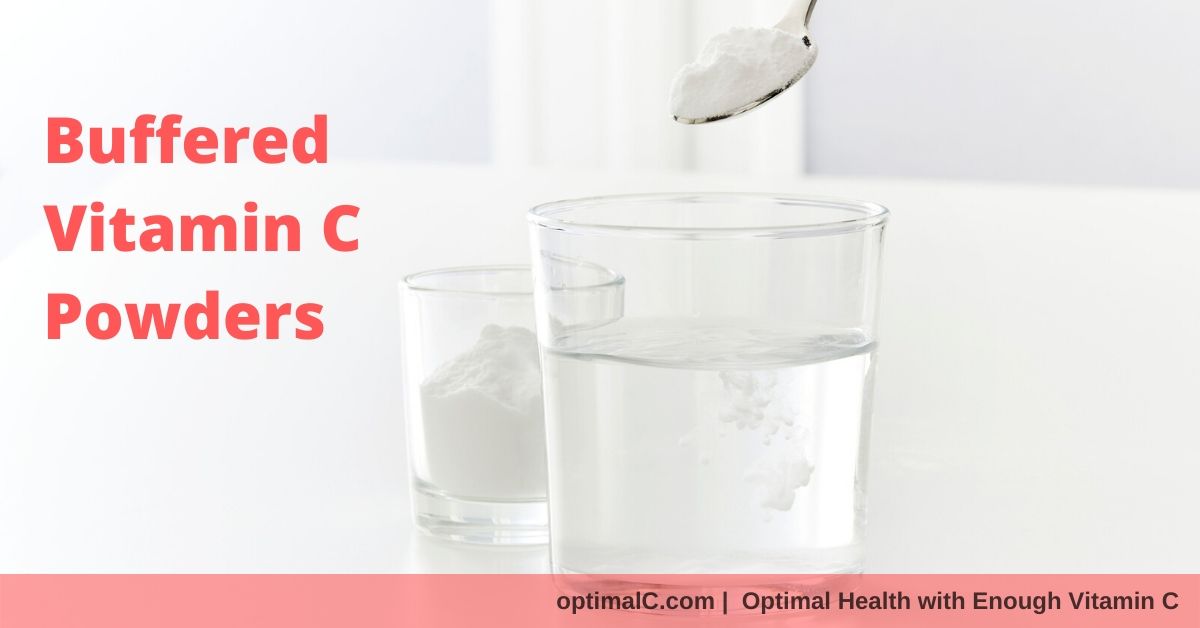Page Contents
Buffered Vitamin C Powder: What You Need to Know
By Arturo Galindo, Cert. Nutritional Therapist
Buffered vitamin C powder supplements can be a little intimidating. The reason is that there are so many technical names associated with vitamin C or ascorbic acid.
It took us several years to understand the differences. But don’t worry, I’ll try to make things clear for you in this article. This includes when to take a buffered form of vitamin C and safety considerations.
We've prepared this short video for you. You'll learn what our site is about and how you can use this information to improve your health...
Subscribe and Get Our Free eBook!
 |
Important: Ascorbic acid or vitamin C is more than a vitamin. |
What is a Buffered Vitamin C Powder?
A vitamin C powder that is "buffered" mixes vitamin C powder with other nutrients or substances in a powder form.
Here are some of the reasons why:
- Lessen or moderate the impact of pure ascorbic acid
- Provide extra nutrients into the body
- Enhance absorption of Vitamin C in the body
- Help treat specific conditions
Buffered Forms of Vitamin C
Ascorbic acid refers to the vitamin c powder that is not mixed with any other substance. The vitamin C is "pure" or not buffered.
But, If ascorbic acid powder mixes with other substances you have a buffered powder. And there are different technical names to identify vitamin C powders that are buffered.
Below are some of these buffered forms. These forms are also called mineral ascorbates because they are less acidic.
Sodium Ascorbate
Sodium ascorbate is ascorbic acid mixed with sodium bicarbonate.
This is done to balance the pH for people with stomach sensitivities and/or provide extra sodium.
Sodium ascorbate donates one less electron than ascorbic acid. And it's also the substance used for intravenous injections of vitamin C.
Calcium Ascorbate
Calcium ascorbate is ascorbic acid mixed with calcium.
This is done to balance the pH for people with stomach sensitivities and/or provide extra calcium.
Calcium ascorbate is more expensive than ascorbic acid, but it’s still cheaper than a lot of other forms. Here's more information about calcium ascorbate.
Magnesium Ascorbate
Magnesium ascorbate is ascorbic acid mixed with magnesium.
This is done to balance the pH for people with stomach sensitivities and/or provide extra magnesium.
Magnesium ascorbate is generally more expensive than the other buffered forms.
Safety of Buffered Vitamin C Powder Supplements
Stomach sensitivity is the main reason people take a buffered vitamin C powder. If you have stomach sensitivity to ascorbic acid, you can try one of the buffered forms.
But there's an important safety consideration when taking buffered vitamin C powder supplements. I's not recommended to use them for therapeutic purposes or very large amounts.
This is because if you take them in large amounts, minerals are also absorbed by the body in large amounts.... and they may have toxic levels. One example is calcium ascorbate.
Dr. Thomas Levy is one of the vitamin C experts. In his website, Dr. Levy mentions how calcium supplementation raises the risk of cardiovascular disease.
Should You Take Buffered Vitamin C Powder Supplements?
This is a decision that only you can make based on what your body needs. Many people try one of the buffered forms while they get used to pure ascorbic acid. Then they make the switch.
The important thing is that you take your vitamin C, in the amounts that your body needs, in a safe way.
You need to find what works for you. Do your work. You won’t regret it.
When you're skilled at taking vitamin C supplements, you’ll most likely use a combination of all forms. This includes powders, buffered or not, tablets, and liposomes.
This is because you’ll want to give your body what it needs when it needs it, in the best form available... so it can keep you healthy longer.
Also, subscribe to your blog and download our free eBook with a list of the best vitamin c supplements that our family uses and trusts.
Sources
- US National Library of Medicine - Calcium ascorbate
- Oregon State University - Supplemental forms of vitamin C
- Dr. Thomas Levy- Calcium
 |
By Arturo Galindo I have used vitamin C and nutrition for over 10 years to end my chronic diseases and help my family stay healthy. Learn about our story. |
Subscribe and Get Our Free eBook!
Follow us on Social Media!
How do you feel about what you just read?









Facebook Comments
Have your say about what you just read! Leave a comment in the box below.